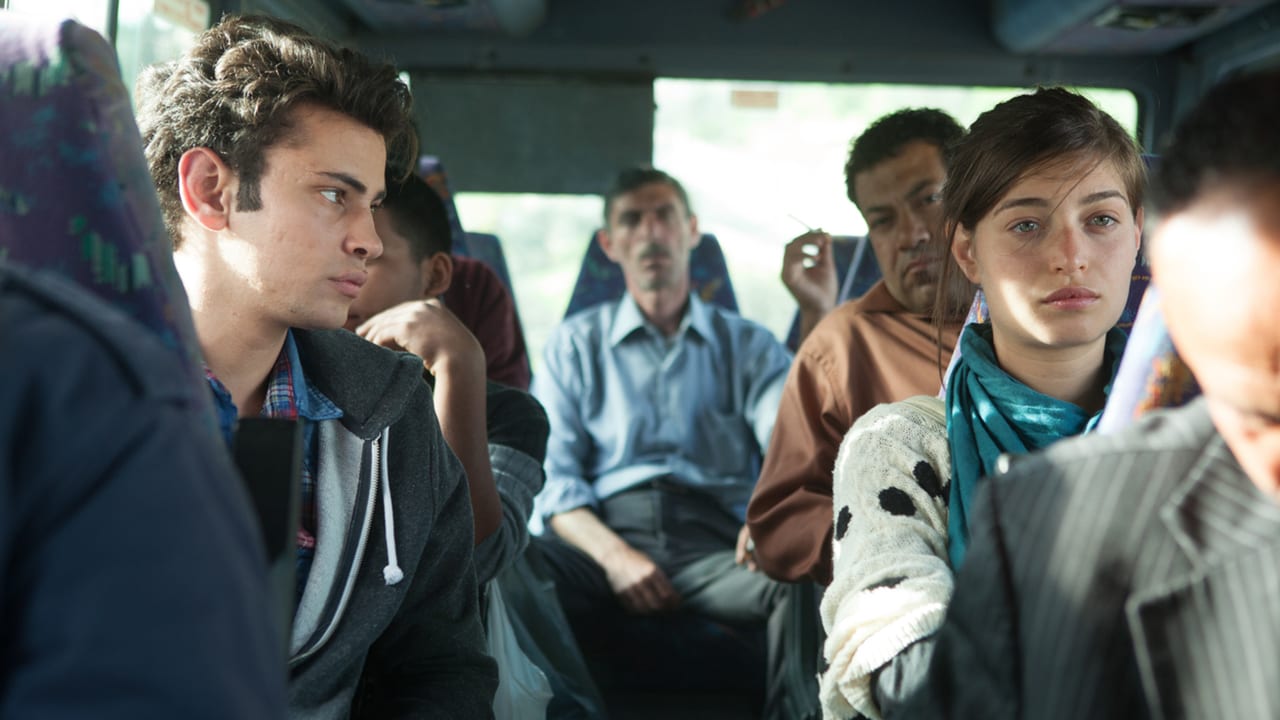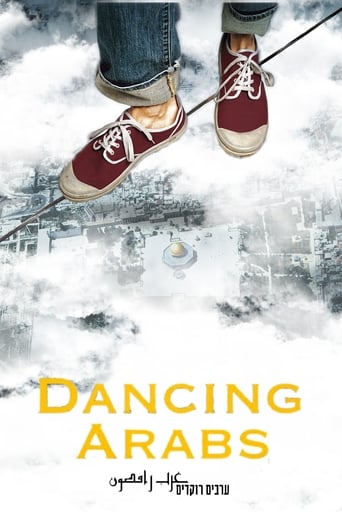

Making a film in Israel with Palestinians is problematic. After all, the film could be seen as either too pro-Jewish or too pro- Palestinian by some and as a result, lose a major portion of the potential audience. However, "A Borrowed Identity" manages to create a story that both sides of the ideological perspective could appreciate and enjoy.The story is about a Palestinian boy, Eyad. You see him grow to his teen years through the first portion of the film and he's so bright that he's offered admission to the best school in Israel--and he'll be the only Palestinian in an otherwise all Jewish program. The film follows the young man through high school from his early awkward time to acceptance by his peers until he ultimately does something a Palestinian isn't supposed to do--fall in love with a Jewish girl. At first, things look great for Eyad and his girlfriend, Naomi. However, she is hesitant to tell her parents about her boyfriend and he's also hesitant to tell his family as well. When he loses her over this, he decides on another path...and it involves pretending to be Jewish so that his life will be easier.There is a lot to like about this film as is touches on some divisive topics. It's not just the Palestinian/Jewish conflict but there's also a subplot involving quality of life issues for a friend of Eyad. Yonathan has Multiple Sclerosis and through the course of the movie, he becomes less and less functional until he's just a shell of who he once was. All of this makes for a fascinating film that I enjoyed and which was mostly well crafted. I say mostly because Eyad was played so incredibly detached and non-emotive through so much of the film--a bit too much for me, as this tended to make him seem less real. But the good far outweighs the bad with this one and it's a film that is totally unique and captivating.
... View MoreThe Israeli film "Dancing Arabs" was shown in the U.S. as "A Borrowed Identity." It was directed by Eran Riklis. The movie stars Tawfeek Barhom as Eyad, a Palestinian boy who is an Israeli citizen. Although his plight isn't as bad as a non-Israeli Palestinian, he is nonetheless a second-class citizen. (Palestinian citizens work in restaurants as dishwashers. Jewish citizens work as waiters.)Despite being Palestinian, Eyad is allowed to attend a prestigious Israeli boarding school. Naturally, he's the target of racial slurs, but he isn't physically injured, and he moves forward toward adulthood. As part of a class assignment, he meets Jonathan (Michael Moshonov), a young man who has progressive muscular dystrophy. He also meets an Israeli girl, Naomi, played by Daniel (Danielle) Kitsis. Naomi is intelligent and loving, but the question is whether their relationship has a future, because of their cultural and religious differences.The plot moves in unexpected directions, and the movie is emotionally powerful and gripping. The acting is excellent, and I think the plot represents a balanced picture of the Israeli/Palestinian conflict, as it plays out among individuals.We saw this movie at the Little Theatre in Rochester, as part of the highly successful Rochester International Jewish Film Festival. The film will work well on the small screen.
... View MoreEran Riklis manages a touching humanist film that should engage and expand both sides of the Arab/Jewish divide in Israel — and beyond.It follows a bright young Arab boy Eyad, whose intelligent father — consigned by his earlier political activity to a career as fruit-picker — gets him into the country's premier Jewish high school. With that family as its centre the film obviously reveals the Arabs' difficulties in the (understandably) wary Jewish country. The Arabs make up 20% of the population, so they understandably chafe at soldiers checking their IDs and teachers' snide remarks and the conviction the system is prejudiced against them. Arabs steam in the kitchen while the Jewish boys get the better paying jobs as waiters. As Eyad's father summarizes it, "We want to live in dignity." Eyad's experience broadens when a community service project leads him into a friendship with Ionathan, a Jewish boy crippled with MS. He also has an affair with a bright, pretty Jewish student, Naomi, whose parents pull her out of the school to end their contact. To enable her to return, Eyad gallantly leaves the special school and studies for his exams on his own, while working in restaurants. His father disowns him in anger and disappointment.Riklis is careful to present the Jews' perspective as well. An Arab teacher teaches the map of Palestine — denying Israel — then unrolls the Israel map when the Jewish principal enters. Eyad's father and friends are certain Saddam Hussein will repel the US attack and destroy Israel in a few days. His mother knows better. The Arabs dance on their rooftops when they see the scud missiles fired at Israel.But that image does not explain the title. As Riklis told the Palm Springs festival audience, he had two other contexts in mind. Mainly the phrase suggests the Arabs' restriction to servicing (figuratively: dancing for) the Jews, whether in the kitchens or cleaning up their mess (as Eyad more heroically does for his stricken Jewish friend). He also recalled the Jewish proverb about not being able to swing one behind at two weddings at the same time. Servant Eyad is indeed torn between two dances, the Arab and the Jewish, when he ventures beyond his enclave. At school his summary of the 1948 war is the Jewish version, unshaded, but in a later discussion of Jewish contemporary fiction he details the conventions of Arab stereotypy.The two boys' mothers provide the film's moral center. Eyad's Arab mother — who has the stereotype Jewish nose — tacitly supports her son's love affair with the Jewish girl. Her concerns give way to her love and support. Ionathan's mother embraces Eyad for the comfort and life he brings her worsening son. When Ionathan nears the end, Eyad uses his passport to assume his Jewish identity, getting a waiter's job, then opens a bank account in his name to deposit the checks. Ionathan's mother is initially disturbed to discover that ploy, but when she confronts him she immediately softens at his need and promises to keep his secret. In response Eyad writes the high school exams both in his own name and in Ionathan's, securing both their graduations with identical honours. Eyad loses his beloved grandmother. Naomi denies him to win a spot on the Special Intelligence army unit. Eyad goes to university in Berlin, returning for Ionathan's last days. Then comes the film's astonishing climax. It's completely unexpected and yet perfectly inevitable. Ionathan's mother gives her son a Muslim burial under Eyad's name, to enable Eyad to pursue his life under her son's name, freed from the stigma of being an Arab. As Eyad's mother accepted her son having a Jewish lover, Ionathan's embraced her son's Arab friend. She asks him to live with them to ease her strain. Her climactic gesture reverses but fulfills the remarkable prophecy by Golda Meir: There will not be peace until the Arabs decide they love their children more than they hate the Jews. Both boys mothers' realize that; Naomi's doesn't. The message is that peace will be impossible unless both sides abandon their traditions of hatred and war. This Jewish mother abandons her religious tradition, turns her back on the past, to ensure a better future for the next generation of Jew and Arab together. We know her feeling for her Judaism from their sabbath dinner with Eyad. So we gauge the sacrifice she makes for her son's friend. Of course, in assuming the Jewish identity Eyad also abandons his past, including his family and culture. So profound is the schism that only a break with the past will bridge it. Eyad's elementary school is visited by a fatuous presenter of some Children for Peace movement. The film's climax plays out the deeper implications of that hope.
... View MoreBefore its release, this movie was given a subtitle. It's now "Dancing Arabs: A Borrowed Identity." Just as well. The only dancing I recall in the movie is dancing around the loaded issue of the Arab-Israeli conflict. The young protagonist is the only Arab in his school, and he makes friends with individuals while suffering discrimination in the broader social structure. It's no new observation that individuals from opposing groups can get along fine even as those groups as a whole seem to insist on remaining irreconcilable. The author of the story, Sayed Kashua, has been accepted by Jewish Israeli society while still identifying with the Arab community that is largely anti-Israeli, and the movie shows Arab hostility as counterproductive on the one hand while also showing the behavior of some Israeli Jews-- again, not so much individuals as groups-- as intolerant. According to Kashua, the movie is roughly autobiographical. With his books, along with a series of newspaper columns and a comical TV series about the stresses of being an Arab in Jewish-dominated Israeli society, Kashua won plaudits in Israel and this movie was set for a big opening when, as will happen, war with Gaza broke out. The opening was postponed for some months. At more or less the same time, Kashua received an opportunity to take up a temporary position in the USA and when he left Israel he declared glumly that he wasn't sure he would ever bother to return. So a pall is cast over the film, although the film itself is a good job from Eran Riklis, whose movies are often about individuals on a journey that helps them understand who they are.
... View More